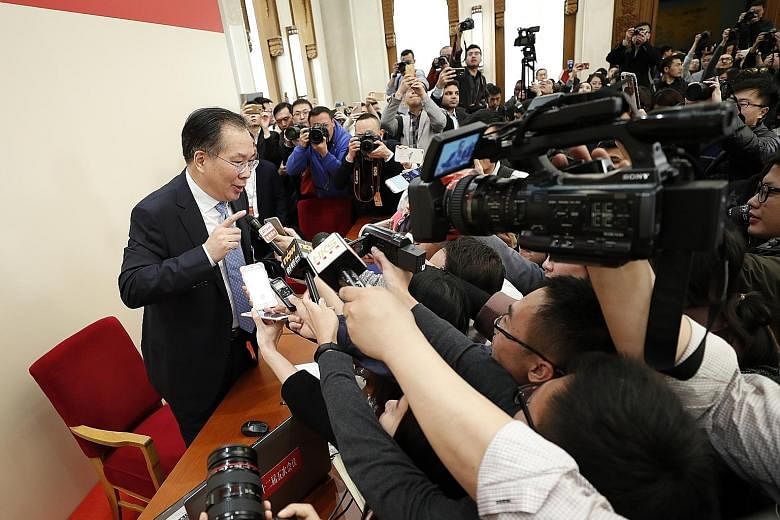Transforming laggards in its economy and erasing poverty is a key part of China's push to become a moderately prosperous society.
This commitment to help to uplift the tail-end of the world's second-largest economy comes ahead of the Chinese People's Political Consultative Conference (CPPCC), an annual meeting which opens today and kick-starts political sessions that set the tone for China's outlook this year.
The spokesman for the CPPCC or China's top political advisory body, Mr Wang Guoqing, stressed yesterday the importance of "high attention" given to ongoing reforms, whether in the farming sector, the rust-belt provinces of north-east China or state-owned enterprises.
The per-capita disposable income of rural Chinese grew by 6.2 per cent in real terms last year, the lowest growth in a decade.
Mr Wang attributed this to a confluence of factors, such as the low prices of agricultural produce and low wages for migrant workers.
The CPPCC had called attention to this problem at a macroeconomics meeting last July, he added, and made recommendations to the government that included improving the agriculture subsidies system, developing new channels to raise farmers' income such as through online sales, and speeding up household registration reform.
China has said that major problems facing its agricultural sector are structural in nature, and for the 14th year running, the government's first policy document of the year is focused on rural reform.
"The 'No. 1 Document' made it clear that the main goal of agricultural, supply-side structural reform is to get farmers richer," said Mr Wang, referring to the document by its formal name. "As long as the various policy measures in the 'No. 1 Document' are truly implemented, then whether it's the small target of raising each farmer's income or the grand objective of rural and agricultural development, we are optimistic about the prospects."
Socio-economic issues dominated yesterday's press conference, underscoring China's key concerns.
Another top priority is the continued revitalisation of the north-east industrial base, which Mr Wang called an "arduous" task.
He said while most research trips cover a city in one-and-a-half days, researchers can spend that much time just to understand the problems at an enterprise in Heilongjiang, Jilin or Liaoning.
Refuting claims that the reform of state-owned enterprises was proceeding slowly, he added that strategies such as mixed ownership are not a cure-all and that the government has to ensure there is no loss of state-owned assets.
His remarks came after President Xi Jinping this week called on government departments to unswervingly solve the problem of zombie enterprises that are often debt-laden and unprofitable.
To ensure reforms are on track, Mr Wang said the CPPCC will do "supervisory research" on how its recommendations are implemented.
"The CPPCC will surely leverage its advantage of being a galaxy of talent and keep offering practical solutions for revitalising north-eastern China," added Mr Wang, in a nod to the diverse backgrounds of the more than 2,000 CPPCC delegates.
"This undertaking requires strong policy support and firm confidence."

